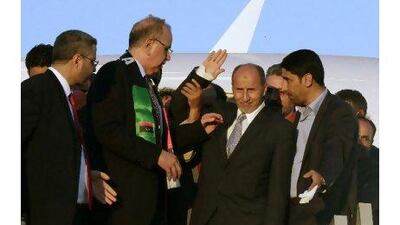BENGHAZI // Mustafa Abdel Jalil, the interim head of Libya's new government, was treated to a red-carpet welcome for his first visit to Tripoli since the revolution, but in Benghazi the move was viewed with growing suspicion.
"Let's not forget Benghazi, the spark of the revolution," Amal Obeidi, a political science professor at the University of Garyounis, told an audience of academics, lawyers and doctors on Saturday morning about the same time the National Transitional Council (NTC) chief was arriving in the capital.
"Mr Jalil has gone to Tripoli, but he must include the east in everything from now on."
Half of the NTC executive committee has relocated to Tripoli. Many of the officials dealing with restarting the economy and establishing law and order have been spending more time in the west. And with news filtering haphazardly across a country hampered by spotty telecommunications networks, the situation is giving rise to fears that the new Libya will not remember the sacrifices of the young rebels of Benghazi and Misurata, who did the bulk of the fighting during the last six months.
Mr Jalil has remained remarkably even-keeled in his speeches, suggesting a strong comprehension of the potential divisiveness ahead. After arriving in Tripoli, he spoke of the need to unify the country by force after Col Muammar Qaddafi's loyalists in Bani Walid, Sirte and Sabha refused to surrender.
"The National Transitional Council has mapped out a path and we hope that Libyans understand that we have to move along this path fast and that it is no time for revenge," he said. "We should put all our forces together to liberate the remaining Libyan cities of Bani Walid, Sabha and Sirte."
Yet, these forces are likely to play a large role in how Libyan democracy is shaped in the coming months.
The underlying gap between East and West Libya - and cities that joined the revolution early and those that were forcefully liberated - could push the country towards a federalist type of democracy, according to officials at the National Democratic Institute, a think tank funded by the US Congress and located in Washington.
Mátyás Eörsi, the country director for the group and former member of parliament in Hungary, said one problem that could arise from a country built on semi-autonomous states is that there could be pressure not to distribute the wealth evenly.
"The wealthiest part of the country is in the East," he said. "The question is will they push for an individual budget if the country goes down a federalist path for the new government."
An important objective for the NTC now is to make people in the country feel that the government is as inclusive as possible - especially after decades of dictatorship masquerading as democracy and favouritism to some cities.
Mr Eörsi said the NTC was acting fairly, but was operating with an abundance of caution because it was only the interim government. This has led to some perceptions that they have secret agendas at work, an argument he doesn't buy.
"For instance, with the constitution, everyone must feel that it is 'my constitution'," he said. "I think that the debate over the constitution should start now to start the process of people feeling ownership over the future of the country and the government."
The geographic split was more nuanced than a line cutting the country in half, said Mohammed Saad Ambarak, the president of the Libyan International Medical University and head of an influential political committee that meets each week in Benghazi.
On the west side of the country, for instance, the city of Misurata was fervently in favour of the revolution and suffered some of the most intense battles in the last several months. While Tawurgha to the south joined Col Qaddafi's forces and is now viewed by Misuratans as a stronghold of traitors. There is Benghazi, the fount of the revolution, and Sirte, the recipient of decades worth of patronage from the regime.
But, Dr Ambarak argues that "there is more in this country to unite us, than to divide us. We have a long history of reconciliation," he said. "We permitted former members of the Fascist party to take part in the new government after our independence in 1951. We will be able to unify again."

